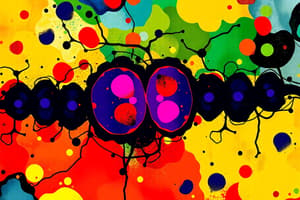Podcast
Questions and Answers
What is the primary focus of cell biology?
What is the primary focus of cell biology?
- Researching the behavior of chromosomes
- Investigating the history of scientific inventions
- Exploring the structure and function of cells (correct)
- Studying the interactions of living organisms with the environment
Who were the scientists responsible for formulating the cell theory in 1838?
Who were the scientists responsible for formulating the cell theory in 1838?
- Robert Hooke and Anton Van Leeuwenhoek
- Matthias Schleiden and Theodor Schwann (correct)
- Gregor Mendel and Rosalind Franklin
- Louis Pasteur and Charles Darwin
Which invention played a crucial role in the beginning of cell biology?
Which invention played a crucial role in the beginning of cell biology?
- The formulation of the cell theory
- The invention of the electron microscope
- The discovery of DNA
- The creation of the compound microscope (correct)
What are the essential units responsible for the functioning and existence of diverse organisms?
What are the essential units responsible for the functioning and existence of diverse organisms?
Which branch of biology delves into the inner workings of the cellular world?
Which branch of biology delves into the inner workings of the cellular world?
What techniques do cell biologists use to study complex processes within cells?
What techniques do cell biologists use to study complex processes within cells?
What is the role of chromosomes in cells?
What is the role of chromosomes in cells?
How many chromosomes do human cells typically contain?
How many chromosomes do human cells typically contain?
What is the function of meiosis in cell division?
What is the function of meiosis in cell division?
How does sex determination occur in humans?
How does sex determination occur in humans?
Which process ensures the continuity of genetic information across generations?
Which process ensures the continuity of genetic information across generations?
What components make up a chromosome?
What components make up a chromosome?
Study Notes
Biology: Exploring the Foundations of Life
Biology, the scientific study of living organisms and their interactions with the environment, provides insights into the intricate processes that govern life at the fundamental level. This comprehensive guide delves into the fascinating subtopics of cell biology and chromosomes, offering a deep dive into the inner workings of the cellular world that lies at the core of all living beings.
Cell Biology: Unraveling the Structural and Functional Units of Life
Cell biology, a branch of biology that studies the structure, function, and behavior of cells, is integral to understanding life's foundational building blocks. All living organisms are composed of cells, which serve as the essential units responsible for the functioning and existence of diverse organisms. Cell biologists employ various techniques such as microscopy, cell culture, and cell fractionation to study the complex processes that occur within cells.
History of Cell Biology: From Cork to Science
The history of cell biology began with the invention of the compound microscope in the 17th century, which enabled scientists like Robert Hooke and Anton Van Leeuwenhoek to observe individual cells for the first time. The concept of a living organism being composed of cells was later solidified by Matthias Schleiden and Theodor Schwann's formulation of the cell theory in 1838, stating that all living things are made up of cells and that cells arise from pre-existing cells.
Chromosomes: The Carriers of Genetic Information
Chromosomes play a crucial role in the transmission and expression of genetic information within cells. Human cells contain 23 pairs of chromosomes, totaling 46 chromosomes per cell. Chromosomes are composed of DNA, proteins, and various other molecules that help package and organize the genetic material within the cell.
Cell Division: The Essential Process of Splitting Up DNA
Cell division is a vital process that ensures accurate distribution of genetic material during the creation of new cells. Two primary types of cell division occur: mitosis, which produces genetically identical cells, and meiosis, which generates cells with half the number of chromosomes, leading to genetic variation. Both processes ensure the continuity of genetic information across generations.
Sex Determination and Differentiation
Sex determination in humans is primarily determined by the presence of the Y chromosome in the fertilized egg, which stimulates the formation of a testicle and subsequently leads to the development of male anatomy. Females possess two X chromosomes, resulting in the formation of ovaries and the development of female anatomy.
In conclusion, cell biology and chromosomes are essential components of our understanding of life at the most fundamental levels. By studying these topics, we gain valuable insights into the intricate processes that govern cellular function, genetic inheritance, and the diversity of living organisms.
Studying That Suits You
Use AI to generate personalized quizzes and flashcards to suit your learning preferences.
Description
Test your knowledge on cell biology, chromosomes, cell division, and sex determination in this quiz. Explore the structural and functional units of life and learn about the carriers of genetic information within cells.



